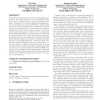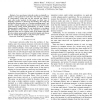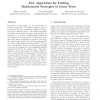106 search results - page 7 / 22 » Connectivity and Equilibrium in Random Games |
NETWORKING
2004
13 years 8 months ago
2004
The goal of this paper is to study pricing of differentiated services and its impact on the choice of service priority at equilibrium. We consider both TCP connections as well as n...
CSE
2009
IEEE
14 years 2 months ago
2009
IEEE
—We propose a parallel algorithm for finding Nash equilibria in n-player noncooperative games. The algorithm is based on enumerating the supports of mixed strategies in parallel...
MOBIHOC
2012
ACM
11 years 9 months ago
2012
ACM
A key feature of wireless communications is the spatial reuse. However, the spatial aspect is not yet well understood for the purpose of designing efficient spectrum sharing mecha...
INFOCOM
2005
IEEE
14 years 28 days ago
2005
IEEE
Abstract— In a peer-to-peer network, nodes are typically required to route packets for each other. This leads to a problem of “free-loaders,” nodes that use the network but r...
STOC
1994
ACM
13 years 11 months ago
1994
ACM
Interactions among agents can be conveniently described by game trees. In order to analyze a game, it is important to derive optimal (or equilibrium) strategies for the di erent p...



